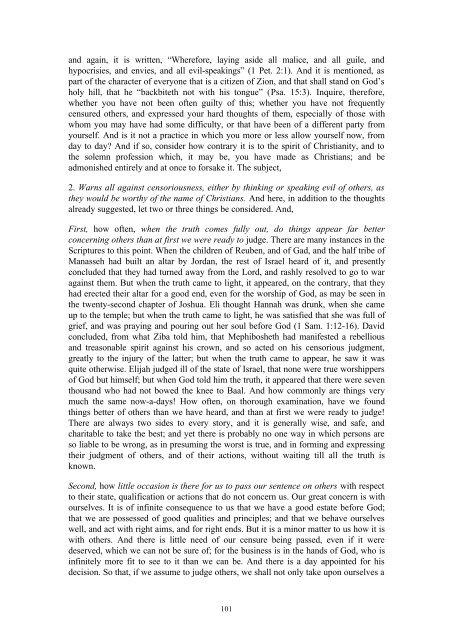CHARITY AND IT'S FRUITS BY JONATHAN EDWARDS
Few Christian leaders since the Reformation have been as gifted as Jonathan Edwards. A man of intense personal devotion to Christ, he was a leader of revival, and a creative Reformed theologian as well as A Missionary. Charity and Its Fruits gives us an insight into Edward's regular pulpit ministry in the years between the Northampton revival of 1735 and 'the Great Awakening' of 1740.
Few Christian leaders since the Reformation have been as gifted as Jonathan Edwards. A man of intense personal devotion to Christ, he was a leader of revival, and a creative Reformed theologian as well as A Missionary. Charity and Its Fruits gives us an insight into Edward's regular pulpit ministry in the years between the Northampton revival of 1735 and 'the Great Awakening' of 1740.
You also want an ePaper? Increase the reach of your titles
YUMPU automatically turns print PDFs into web optimized ePapers that Google loves.
and again, it is written, “Wherefore, laying aside all malice, and all guile, and<br />
hypocrisies, and envies, and all evil-speakings” (1 Pet. 2:1). And it is mentioned, as<br />
part of the character of everyone that is a citizen of Zion, and that shall stand on God’s<br />
holy hill, that he “backbiteth not with his tongue” (Psa. 15:3). Inquire, therefore,<br />
whether you have not been often guilty of this; whether you have not frequently<br />
censured others, and expressed your hard thoughts of them, especially of those with<br />
whom you may have had some difficulty, or that have been of a different party from<br />
yourself. And is it not a practice in which you more or less allow yourself now, from<br />
day to day? And if so, consider how contrary it is to the spirit of Christianity, and to<br />
the solemn profession which, it may be, you have made as Christians; and be<br />
admonished entirely and at once to forsake it. The subject,<br />
2. Warns all against censoriousness, either by thinking or speaking evil of others, as<br />
they would be worthy of the name of Christians. And here, in addition to the thoughts<br />
already suggested, let two or three things be considered. And,<br />
First, how often, when the truth comes fully out, do things appear far better<br />
concerning others than at first we were ready to judge. There are many instances in the<br />
Scriptures to this point. When the children of Reuben, and of Gad, and the half tribe of<br />
Manasseh had built an altar by Jordan, the rest of Israel heard of it, and presently<br />
concluded that they had turned away from the Lord, and rashly resolved to go to war<br />
against them. But when the truth came to light, it appeared, on the contrary, that they<br />
had erected their altar for a good end, even for the worship of God, as may be seen in<br />
the twenty-second chapter of Joshua. Eli thought Hannah was drunk, when she came<br />
up to the temple; but when the truth came to light, he was satisfied that she was full of<br />
grief, and was praying and pouring out her soul before God (1 Sam. 1:12-16). David<br />
concluded, from what Ziba told him, that Mephibosheth had manifested a rebellious<br />
and treasonable spirit against his crown, and so acted on his censorious judgment,<br />
greatly to the injury of the latter; but when the truth came to appear, he saw it was<br />
quite otherwise. Elijah judged ill of the state of Israel, that none were true worshippers<br />
of God but himself; but when God told him the truth, it appeared that there were seven<br />
thousand who had not bowed the knee to Baal. And how commonly are things very<br />
much the same now-a-days! How often, on thorough examination, have we found<br />
things better of others than we have heard, and than at first we were ready to judge!<br />
There are always two sides to every story, and it is generally wise, and safe, and<br />
charitable to take the best; and yet there is probably no one way in which persons are<br />
so liable to be wrong, as in presuming the worst is true, and in forming and expressing<br />
their judgment of others, and of their actions, without waiting till all the truth is<br />
known.<br />
Second, how little occasion is there for us to pass our sentence on others with respect<br />
to their state, qualification or actions that do not concern us. Our great concern is with<br />
ourselves. It is of infinite consequence to us that we have a good estate before God;<br />
that we are possessed of good qualities and principles; and that we behave ourselves<br />
well, and act with right aims, and for right ends. But it is a minor matter to us how it is<br />
with others. And there is little need of our censure being passed, even if it were<br />
deserved, which we can not be sure of; for the business is in the hands of God, who is<br />
infinitely more fit to see to it than we can be. And there is a day appointed for his<br />
decision. So that, if we assume to judge others, we shall not only take upon ourselves a<br />
101

















